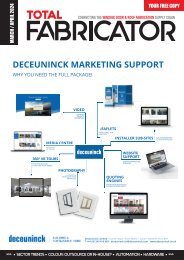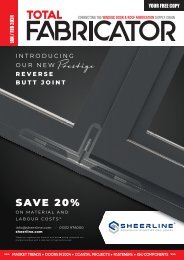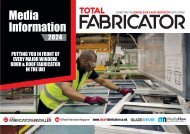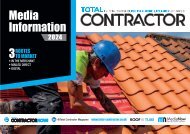March 2018
You also want an ePaper? Increase the reach of your titles
YUMPU automatically turns print PDFs into web optimized ePapers that Google loves.
Industry News<br />
‘DO YOUR RESEARCH’<br />
With the fallout from the collapse of<br />
Carillion still having a huge impact on the<br />
construction sector supply chain, question<br />
marks remain over the fate of 43,000 jobs,<br />
whilst 30,000+ small businesses are<br />
thought to be owed money.<br />
DISTRIBUTOR CALLS FOR CLARITY<br />
Vivalda Group, a leading distributor of<br />
cladding systems, has called for greater<br />
clarity on rainscreen cladding Standards and<br />
confirmed that it no longer promotes<br />
aluminium composite materials (ACM) for use<br />
on high-rise applications which fail to reach<br />
A2 Standard.<br />
Ben Jayes, Managing Director of Vivalda Group<br />
So how can SMEs protect themselves against<br />
such collapses? ArchOver CEO Angus Dent<br />
offers his advice: “Overall, 25% of<br />
bankruptcies are due to unpaid invoices. In<br />
the construction industry, this figure is likely<br />
to be even higher. This is a sector that<br />
experiences the highest levels of insolvency<br />
per year so SMEs need to be more mindful of<br />
the risks they are exposed to.<br />
“Don’t just rely on a big company’s<br />
reputation for reassurance. Look at whether<br />
they have a good record of paying their debts.<br />
Do they have a strong cashflow? Have your<br />
peers had issues with invoicing them?<br />
Consider what would happen if a customer<br />
were to default and ensure that you have<br />
protection, such as credit insurance, in place.<br />
The Carillion case shows that credit insurance<br />
does pay off when a big contractor goes bust<br />
– the payments to its suppliers will range<br />
from £5,000 to several million pounds – but<br />
not nearly enough companies took it out.<br />
The company is concerned that contractors could<br />
inadvertently make unintentional specification<br />
errors, given the complexity of the UK's current<br />
safety standards.<br />
While the initial report on the likely causes of the<br />
Grenfell fire is not expected until spring <strong>2018</strong>,<br />
Vivalda Group has stated that shortcomings in<br />
the current ‘approved inspector’ regime have<br />
created a confusing landscape for contractors.<br />
This scenario has been made worse, according to<br />
Vivalda, by the widespread adoption of complex<br />
laboratory tests used by manufacturers to gain<br />
approval for ‘so-called’ safe systems which are<br />
impossible to replicate on site.<br />
Ben Jayes, managing director of Vivalda Group,<br />
explained: “The issue of fire safety is at the very<br />
top of the agenda for contractors right now, but<br />
many within the industry are not helping to build<br />
confidence in the supply chain. We know of one<br />
manufacturer of ACM that put out ambiguous<br />
claims relating to how their standard material<br />
performs at a high level. But that’s not the whole<br />
story. It’s worth remembering that behind every<br />
panel lies a complex web of subframes, fixings<br />
and fire barriers, none of which this manufacturer<br />
is prepared to detail as part of a system.<br />
“The poor contractor is on the hook should there<br />
be failure in even one minor component, so<br />
confidence in the complete system’s performance<br />
is vital. Besides, setting up a rig for a lab test is<br />
one thing, replicating it on site, 18 metres in the<br />
air, is quite another.<br />
“We’ve looked closely into this and decided in the<br />
best interest of clarity to promote only ACM<br />
products that meet or exceed the gold standard of<br />
A2. Despite their best endeavours, many<br />
customers could be installing systems that may<br />
turn out not to be safe. Thus, we’ve moved to<br />
make the task of A2-standard aluminium<br />
rainscreen cladding simple – by offering only fully<br />
approved claddings and associated fixings.”<br />
What will Hackitt Review mean for contractors? p.62<br />
“When we trust too much in a company’s<br />
longevity or size, we’re making an<br />
understandable but risky mistake.<br />
Investments and contracts can go bad but<br />
that doesn’t mean you can’t take steps to<br />
protect yourself. Just like Carillion didn’t have<br />
to accept tough contracts, SMEs should not<br />
accept contracts where there’s a risk that they<br />
won’t be paid or where there aren’t measures<br />
in place to protect them against losses.<br />
“Do your research, go only with sound<br />
debtors and put protection for your deals in<br />
place.” Payment issues, a contractor’s view: p.76<br />
UK ROOFING AWARDS LUNCHEON <strong>2018</strong><br />
It’s now just under two months<br />
The competition, covering the full<br />
until the UK Roofing Awards<br />
spectrum of roofing disciplines,<br />
Luncheon <strong>2018</strong>.<br />
runs from October to January every<br />
year with judges assessing the<br />
The Awards, which take place at<br />
shortlisted projects on range of criteria including<br />
the Park Plaza Westminster Bridge Hotel, on<br />
degree of difficulty, aesthetics, problem-solving,<br />
Friday 11th May, have established themselves<br />
health & safety, workmanship and environmental<br />
as a key date in the roofing sector’s calendar<br />
qualities.<br />
and promote best practice as well as shine a<br />
light on the high calibre of work which is For further information and to purchase your<br />
carried out on roofing and cladding projects ticket to the UK Roofing Awards Luncheon, visit:<br />
throughout the UK.<br />
www.nfrc.co.uk.<br />
6 TC MARCH <strong>2018</strong>

















